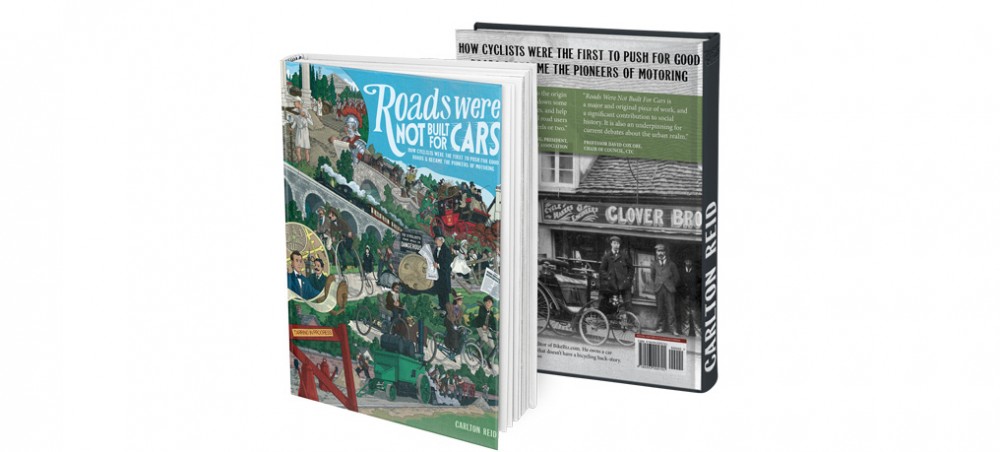Roads Were Not Built For Cars book review
Carlton Reid's new book has proved so popular that you won't get a hard copy before Christmas. Read on for why that's such a shame, but also for how you can still get your hands on it

-
+
A great read in a good-looking book
-
+
Well-written and thoroughly researched with fascinating insights from primary sources
-
-
Due to unprecedented demand you won't get hold of a hard copy before Christmas (but you can gift an iPad version). The second edition, with additional research, is expected in paperback in Jan/Feb 2015
You can trust Cycling Weekly.
Price as reviewed: iPad iBooks £14.99 (inc. 10 short videos); Kindle (standard) £6; ePub £6; Paperback £19.95; Hardback £34.95; Kindle (colour) £16
Somewhere between Hitler and modern historians the history of the roads was re-written to the effect that they were built for motorists, by motorists. In fact, as Carlton Reid reveals, on both sides of the Atlantic it was thanks to early cyclists - also the pioneers of motoring - and their lobbying, that our roads were transformed from dusty, rutted earth tracks in the summer and mud baths in the winter to the all-weather macadamised (tarmac) surfaces we use today.
Roads Were Not Built For Cars, with its 170,000 words and a rich seam of illustrations and historical cartoons, adverts and photographs, was Kickstarter funded in April 2013. Reid says, "Before the Kickstarter campaign I wondered whether anyone would want to pay for a book about 19th Century cyclists changing the world for the better. With £17,000 raised (my target was £4,000) I found out there was demand for the information." The hardback books sold out in six hours.
From Carl Benz, an "enthusiastic cyclist" whose first car used tricycle wheels and cycle tubing and chains, to Henry Ford (whose bicycle was his "pride and joy"), Louis Chevrolet and Sir Charles Rolls, early motor manufacturers honed their skills on bicycle production.
In fact many early movers and shakers were cyclists, including Rockerfeller, who reportedly had a cycle path to the summit of his summer estate in Cleveland, Ohio.
In the late 19th Century bicycles (and tricycles) opened the minds of people to long-distant independent travel at a time when most roads were used only by locals. Characters like Colonel Albert Pope, dubbed the father of the American bicycle industry, lobbied for better road surfaces so his customers could ride their hundred mile "centuries", and he could sell more bikes. His company also manufactured Columbia Cars.
Reid's well-researched and fascinating book also debunks the two tribes myth - as he points out many early racing cyclists also raced motor cars, and many cycling journalists were also motoring journalists. Among these pioneers of our roads who straddled both the motoring and cycling worlds was Henry Sturmey, of hub gear fame, who was editor of both The Cyclist and Motoring magazines. Of course, Cycling Weekly is part of this shared history - its founder, Edmund Dangerfield, also founded truck-trade magazine, Commercial Motor, and later went on to open Britain's first motor museum in Oxford St in 1912.
While some cyclists were called "scorchers" at the beginning of the 20th Century for riding too fast, early motor cars were dubbed "devil wagons" causing "tyranny on the highways".
Car dominance, Reid says, came to us not by design but by stealth. "Roads had very quickly become only for the powerful, with the agent of power being the accelerator pedal".
As Reid concludes, "'Get off the road' - an angry epithet some motorists shout at cyclists - ought to be the longer but more historically accurate 'hey cyclists, thanks for the roads and the cars'."

Thank you for reading 20 articles this month* Join now for unlimited access
Enjoy your first month for just £1 / $1 / €1
*Read 5 free articles per month without a subscription

Join now for unlimited access
Try first month for just £1 / $1 / €1
Get The Leadout Newsletter
The latest race content, interviews, features, reviews and expert buying guides, direct to your inbox!
-
 Dr Sarah Ruggins breaks overall record for cycling length of Britain and back
Dr Sarah Ruggins breaks overall record for cycling length of Britain and backCanadian only got into cycling a few years ago, but has now broken the LEJOGLE record
By Adam Becket Published
-
 ‘It’s a terrible idea and it’s really hard’ - Comedian becomes the first person to cover the US coast-to-coast on a BMX bike
‘It’s a terrible idea and it’s really hard’ - Comedian becomes the first person to cover the US coast-to-coast on a BMX bikeSebastian Fowler covered 3333 miles across 11 states in 80 days pedaling a 20-inch BMX bike loaded with 27 kilos of gear
By Caroline Dezendorf Published
-
 Visma-Lease a Bike settle '100 men v one gorilla' debate, and everything else you missed on social media this week
Visma-Lease a Bike settle '100 men v one gorilla' debate, and everything else you missed on social media this weekOur internet round-up returns with answers to the age's most pressing question
By Tom Davidson Published